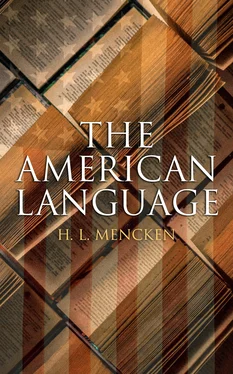Various nautical terms peculiar to America, or taken into English from American sources, came in during the eighteenth century, among them, schooner , cat-boat and pungy , not to recall batteau and canoe . According to a recent historian of the American merchant marine, 20the first schooner ever seen was launched at Gloucester, Mass., in 1713. The word, it appears, was originally spelled scooner . To scoon was a verb borrowed by the New Englanders from some Scotch dialect, and meant to skim or skip across the water like a flat stone. As the first schooner left the ways and glided out into Gloucester harbor, an enraptured spectator shouted: "Oh, see how she scoons!" "A scooner let her be!" replied Captain Andrew Robinson, her builder—and all boats of her peculiar and novel fore-and-aft rig took the name thereafter. The Dutch mariners borrowed the term and changed the spelling, and this change was soon accepted in America. The Scotch root came from the Norse skunna , to hasten, and there are analogues in Icelandic, Anglo-Saxon and Old High German. The origin of cat-boat and pungy I have been unable to determine. Perhaps the latter is related in some way to pung , a one-horse sled or wagon. Pung was once widely used in the United States, but of late it has sunk to the estate of a New England provincialism. Longfellow used it, and in 1857 a writer in the Knickerbocker Magazine reported that pungs filled Broadway, in New York, after a snow-storm.
Most of these new words, of course, produced derivatives, for example, to stack hay , to shingle , to shuck ( i. e. , corn), to trail and to caucus . Backwoods immediately begat backwoodsman and was itself turned into a common adjective. The colonists, indeed, showed a beautiful disregard of linguistic nicety. At an early date they shortened the English law-phrase, to convey by deed , to the simple verb, to deed . Pickering protested against this as a barbarism, and argued that no self-respecting law-writer would employ it, but all the same it was firmly entrenched in the common speech and it has remained there to this day. To table , for to lay on the table , came in at the same time, and so did various forms represented by bindery , for bookbinder's shop . To tomahawk appeared before 1650, and to scalp must have followed soon after. Within the next century and a half they were reinforced by many other such new verbs, and by such adjectives made of nouns as no-account and one-horse , and such nouns made of verbs as carry-all and goner , and such adverbs as no-how . In particular, the manufacture of new verbs went on at a rapid pace. In his letter to Webster in 1789, Franklin denounced to advocate , to progress , and to oppose —a vain enterprise, for all of them are now in perfectly good usage. To advocate , indeed, was used by Thomas Nashe in 1589, and by John Milton half a century later, but it seems to have been reinvented in America. In 1822 and again in 1838 Robert Southey, then poet laureate, led two belated attacks upon it, as a barbarous Americanism, but its obvious usefulness preserved it, and it remains in good usage on both sides of the Atlantic today—one of the earliest of the English borrowings from America. In the end, indeed, even so ardent a purist as Richard Grant White adopted it, as he did to placate . 21
Webster, though he agreed with Franklin in opposing to advocate , gave his imprimatur to to appreciate ( i. e. , to rise in value), and is credited by Sir Charles Lyell 22with having himself invented to demoralize . He also approved to obligate . To antagonize seems to have been given currency by John Quincy Adams, to immigrate by John Marshall, to eventuate by Gouverneur Morris, and to derange by George Washington. Jefferson, always hospitable to new words, used to belittle in his "Notes on Virginia," and Thornton thinks that he coined it. Many new verbs were made by the simple process of prefixing the preposition to common nouns, e. g. , to clerk , to dicker , to dump , to blow , ( i. e. , to bluster or boast), to cord ( i. e. , wood) to stump , to room and to shin . Others were made by transforming verbs in the orthodox vocabulary, e. g. , to cavort from to curvet , and to snoop from to snook . Others arose as metaphors, e. g. , to whitewash (figuratively) and to squat (on unoccupied land). Others were made by hitching suffixes to nouns, e. g. , to negative , to deputize , to locate , to legislate , to infract , to compromit and to happify . Yet others seem to have been produced by onomatopoeia, e. g. , to fizzle , or to have arisen by some other such spontaneous process, so far unintelligible, e. g. , to tote . With them came an endless series of verb-phrases, e. g. , to draw a bead , to face the music , to darken one's doors , to take to the woods , to fly off the handle , to go on the war-path and to saw wood —all obvious products of frontier life. Many coinages of the pre-Revolutionary era later disappeared. Jefferson used to ambition but it dropped out nevertheless, and so did to compromit , ( i. e. , to compromise), to homologize , and to happify . Fierce battles raged 'round some of these words, and they were all violently derided in England. Even so useful a verb as to locate , now in perfectly good usage, was denounced in the third volume of the North American Review, and other purists of the times tried to put down to legislate .
The young and tender adjectives had quite as hard a row to hoe, particularly lengthy . The British Critic attacked it in November, 1793, and it also had enemies at home, but John Adams had used it in his diary in 1759 and the authority of Jefferson and Hamilton was behind it, and so it survived. Years later James Russell Lowell spoke of it as "the excellent adjective," 23and boasted that American had given it to English. Dutiable also met with opposition, and moreover, it had a rival, customable ; but Marshall wrote it into his historic decisions, and thus it took root. The same anonymous watchman of the North American Review who protested against to locate pronounced his anathema upon "such barbarous terms as presidential and congressional ," but the plain need for them kept them in the language. Gubernatorial had come in long before this, and is to be found in the New Jersey Archives of 1734. Influential was denounced by the Rev. Jonathan Boucher and by George Canning, who argued that influent was better, but it was ardently defended by William Pinkney, of Maryland, and gradually made its way. Handy , kinky , law-abiding , chunky , solid (in the sense of well-to-do), evincive , complected , judgmatical , underpinned , blooded and cute were also already secure in revolutionary days. So with many nouns. Jefferson used breadstuffs in his Report of the Secretary of State on Commercial Restrictions, December 16, 1793. Balance , in the sense of remainder, got into the debates of the First Congress. Mileage was used by Franklin in 1754, and is now sound English. Elevator , in the sense of a storage house for grain, was used by Jefferson and by others before him. Draw , for drawbridge , comes down from Revolutionary days. So does slip , in the sense of a berth for vessels. So does addition , in the sense of a suburb. So, finally, does darkey .
Читать дальше












